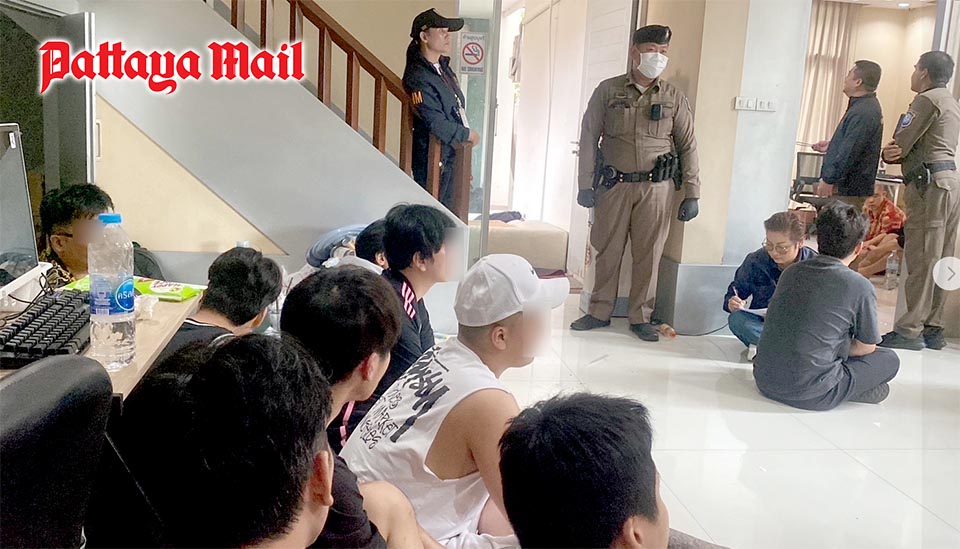Pattaya tourist safety caught in political tug-of-war amid other legal loopholes
Police rushed to identify a Chinese man found dead after falling from the sixth floor of a building on July 5. Following the incident, many Chinese nationals fled the premises. Authorities evacuated the building and inspected the sixth floor, believed to be an illegal call center hub.
PATTAYA, Thailand – Pattaya, one of Thailand’s premier tourist destinations, finds itself at the center of a heated political debate over the true state of tourist safety — a crucial issue that directly impacts the city’s economic lifeline. Recent exchanges among political leaders reveal a clash of narratives, each with implications for public confidence and the future of tourism.
At the heart of the dispute is conflicting messaging between key figures in government. Prime Minister Paetongtarn Shinawatra recently attributed the decline in Chinese tourist arrivals to concerns over safety, a responsibility she linked to the Interior Ministry. However, Bhumjaithai Party leader Anutin Charnvirakul quickly pushed back, clarifying that the Interior Ministry does not oversee the police, who are primarily responsible for security enforcement.
Anutin accused political opponents of oversimplifying and politicizing the issue. He insisted that during his tenure as Interior Minister, provincial authorities were directed to prioritize visitor safety and convenience — signaling that blaming a single ministry does not capture the full picture.
Meanwhile, many local residents and tourism stakeholders point to persistent loopholes undermining tourist safety in and around Pattaya. These include inadequate regulation and oversight of tour buses, which often operate on poorly maintained roads and at unsafe speeds. Crosswalks and pedestrian safety remain problematic, with tourists frequently facing hazardous conditions while navigating busy streets.
The rise in petty theft and pickpocketing has also raised alarms, especially in crowded tourist hotspots and markets. Compounding concerns, Pattaya’s designation as a cannabis “free zone” has created legal ambiguities that sometimes confuse visitors and complicate enforcement efforts.
Pattaya is frequently known as a hotspot for online scams, with numerous arrests underscoring the ongoing challenges in tackling fraud networks that target both tourists and local residents.
Adding another layer of controversy is the ongoing debate over casino legalization. Many voices argue that introducing casinos and gambling-related entertainment complexes risks putting young Chinese visitors and local youths in jeopardy by exposing them to gambling addictions and related social harms. Critics urge lawmakers to exclude casino bills from future legislative agendas to protect vulnerable minds and preserve Thailand’s family-friendly tourism image.
Pattaya is also known from time to time as a hub for online scams, with numerous arrests highlighting ongoing challenges in combating fraud rings targeting both tourists and locals. Such illegal activities tarnish the city’s image and add to safety concerns. In addition, kidnapping incidents and aggressive loan shark operations have surfaced occasionally, further complicating the city’s security landscape.
Furthermore, road accidents remain a serious problem, with occasional crashes involving tourists sometimes resulting in fatalities. Unsafe driving behaviors, coupled with heavy traffic and busy tourist areas, exacerbate risks on the roads, adding another dimension to the safety challenges Pattaya faces.
These gaps expose a patchwork of safety issues that local authorities have struggled to manage effectively, feeding into broader perceptions of insecurity.
This political back-and-forth highlights how tourist safety in Pattaya is caught up in larger power struggles and differing agendas. Meanwhile, the city’s hospitality sector and local businesses face mounting uncertainty as mixed messages potentially undermine traveler confidence.
Tourism experts warn that consistent, transparent communication and effective coordination among agencies are essential to restoring Pattaya’s reputation as a safe and welcoming destination. Until political disputes settle and practical safety measures are tightened, Pattaya risks remaining collateral damage in a game where tourist safety becomes a pawn rather than a priority.



